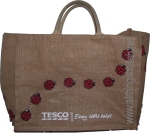Tesco ist ein britischer Supermarkt – und nicht nur irgendein Supermarkt, sondern der Vater der Supermärkte. Jack Cohen hatte auf einem Marktstand Lebensmittel verkauft und dem Tee einen eigenen Namen gab: TESCO. Er setzt sich aus dem Namen des Lieferanten und seinem eigenen Namen zusammen.
 Heute ist Tesco ein sehr erfolgreicher Supermarkt in Großbritannien und der viertgrößte weltweit. Allein auf der britischen Insel bestehen knapp 2000 Filialen, insgesamt gibt es weit über 4000. Viele Filialen haben 24 Stunden außer Sonntags geöffnet.
Heute ist Tesco ein sehr erfolgreicher Supermarkt in Großbritannien und der viertgrößte weltweit. Allein auf der britischen Insel bestehen knapp 2000 Filialen, insgesamt gibt es weit über 4000. Viele Filialen haben 24 Stunden außer Sonntags geöffnet.
Online bei BBC habe ich einen Artikel gelesen, in dem es darum geht die Ausgaben der Regierung mit weniger Nullen zusammenzufassen und mit einer “neuen” Maßeinheit sie verständlicher zu machen. Nämlich – Überraschung: Tesco
40bn (Billionen) britische Pfund = 1 Tesco
Ein paar Beispiele wären z.B. die britische Wirtschaft entspräche 35 Tesco, die jährlichen Regierungsausgaben würden sich auf 15 Tesco belaufen und die Kosten im Gesundheitswesen entsprächen 2,5 Tesco.
Ob diese Gedanken Zukunft haben?
 In den Filmen wird das Leben parodiert und zum Beispiel in “Carry on Nurse” wird der Alltag in einem Krankenhaus etwas auf die Schippe genommen. Natürlich auf die damals aktuellen Umstände bezogen. Es gibt besonders nervige Patienten, aber auch Patienten zum verlieben. Ebenso auch die etwas tollpatschige Lernschwester und die sehr strenge “Matron” (Oberschwester) die regelmäßig ihre Kontrollgänge macht. Es ist ein relativ seichter Humor, aber trotzdem sehr amüsant. Besonders die Szene als die Patienten sich selbst operieren wollen.
In den Filmen wird das Leben parodiert und zum Beispiel in “Carry on Nurse” wird der Alltag in einem Krankenhaus etwas auf die Schippe genommen. Natürlich auf die damals aktuellen Umstände bezogen. Es gibt besonders nervige Patienten, aber auch Patienten zum verlieben. Ebenso auch die etwas tollpatschige Lernschwester und die sehr strenge “Matron” (Oberschwester) die regelmäßig ihre Kontrollgänge macht. Es ist ein relativ seichter Humor, aber trotzdem sehr amüsant. Besonders die Szene als die Patienten sich selbst operieren wollen.
